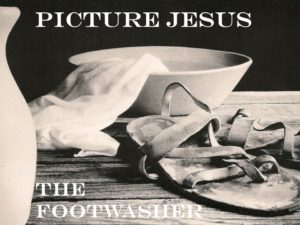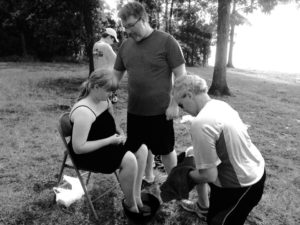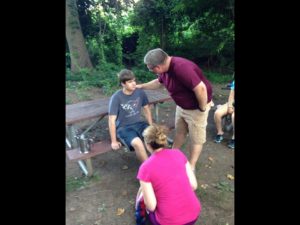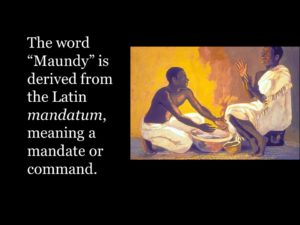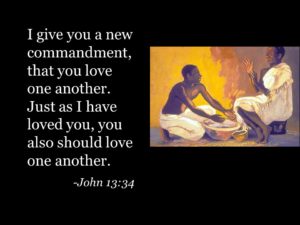You want to wash my what? You want to serve me how? Why would you do that? On that fateful night, Jesus the foot-washer shows us that we are loved, that this love changes us, and empowers us to love others.
In this Lenten season we have pictured Jesus with images of Jesus as the Living Water, the Bread of Life, the Miracle Worker, the Shepherd – each of these had a distinctly Jesus quality to them – work that was cut out for the Son of God, for Jesus the Christ.
Today’s image is a little bit different – the Foot-washer – an image that has a menial, ‘dirty jobs’ quality to it. We might imagine that those first century people, with sandals for footwear, and roads and paths that could be either dusty or muddy – roads that were certainly shared with the flocks and herds that people depended upon – we might imagine those feet to be, gross, icky, maybe even nasty.
And yet, when foot-washing is brought up in our own time and place – people are not all that enthused either. In a world of regular showers, quality footwear and even pedicures – we don’t get real excited about getting too close to one another’s feet.
So, first century or twenty-first century – what is it about the feet that causes us to not want to make eye-contact with the pastor when he asks for volunteers to have their feet washed? What is it about this story of Jesus washing the disciples’ feet that takes such a prominent place in John’s gospel?
I’ll admit that foot-washing wasn’t something I had ever really done until we started doing mission trips a few years ago with our middle and high school youth. Some of the other congregations we went with had the tradition of washing feet during worship toward the end of those trips – so we joined in too.
On that night of worship, as we gather youth and adults, we would typically have one adult washing feet and another offering words of affirmation to the young person whose feet were being washed.
To be honest, especially when you aren’t accustomed to doing something like this, it can feel a little awkward. Still, in those moments, we often would find ourselves laughing or at least smiling in the awkwardness – with that laughter truly reflecting the joy of doing something new and unique and strangely powerful.
You can see some of the pictures of us here in a park outside of Washington DC or in the outskirts of Nashville. And to be honest, in those pictures Brian and Kate are doing way more foot-washing than I.
And so this morning, as we take in this story in John’s gospel, it is important to set the scene for this passage – in the timeline of the story, it is Thursday evening – the night we call Maundy Thursday – a story we will of course revisit in a couple of weeks.
Now, there had to be an intensity to that upper room – Jesus gathered with his disciples – fear and anxiety for the future – the thinly veiled betrayal of Judas – and yet Jesus continuing to equip them, teach them, encourage them to live in a new way.
The word “Maundy” is derived from the Latin mandatum, meaning a mandate or command, and that command comes in this chapter of John when Jesus tells his disciples:
“I give you a new commandment, that you love one another.
Just as I have loved you, you also should love one another” (John 13:34)
But before Jesus gives them this new commandment – in order to show them and not just tell them – Jesus did this thing that felt, especially to Peter, as something beneath his stature and standing as their Rabbi and Leader, we hear that:
During supper Jesus…got up from the table, took off his outer robe, and tied a
towel around himself. Then he poured water into a basin and began to wash the
disciples’ feet and to wipe them with the towel that was tied around him (John 13:3-5)
Why would Jesus do this? The one who healed, the one who had crowds hanging on his every word – the one who God favored and blessed – why would he lower himself to wash those dirty, dusty feet?
We don’t have to wonder why – Jesus tells us:
“Do you know what I have done to you? You call me Teacher and Lord—and you are right, for that is what I am. So if I, your Lord and Teacher, have washed your feet, you also ought to wash one another’s feet. For I have set you an example, that you also should do as I have done to you. (John 13:12-15)
On the night of his betrayal – a night that would soon see him arrested and confronted with all kinds of trumped up charges and undeserved humiliation – Jesus sets an example for his friends, his followers – a way of humility – a way of service – and ultimately a way of life based on love.
Without question, it can be hard to live this way of life – people may look at you strangely – they may wonder what your real deal is, what’s the angle, what’s the ulterior motive – you want to wash my what? You want to serve me how? Why would you do that?
Answer…because Jesus said so – Jesus gave us an example to live out. Embedded in that example is the depth and breadth of God’s love – a love that empowers us to serve, and to extend God’s love to others.
Today in our time together we have time set aside for prayer – to offer up our concerns and our hopes – to seek healing for ourselves and for our world. In our prayer and service and worship, we have the opportunity to live into Jesus’ new command to love – not always perfectly, but meaningfully and powerfully.
On that fateful night, Jesus the foot-washer shows us that we are loved, that this love changes us, empowering us to love others, and that even when we struggle, that God continues to love us and work through our lives to bless the world God has created and that God continues to sustain.
Amen.
Rev. John Berg
Gloria Dei Lutheran Church, Northbrook, IL

